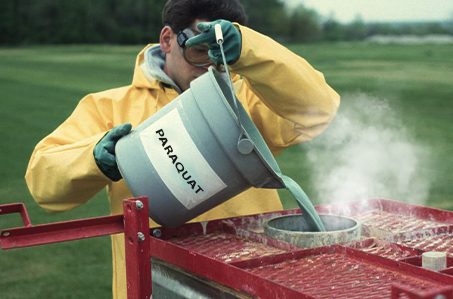Raleigh, NC: (919) 277-9299

Parkinson’s disease and the agricultural industry will be forever linked. Herbicides containing paraquat dichloride are some of the most widely used agricultural chemicals. If you work in the agricultural industry or you are a commercial landscaper, you may be at an increased risk of paraquat-induced Parkinson’s disease. For decades, agricultural workers sprayed and worked in fields without being appropriately warned about the risks posed by paraquat.
Manufacturers understood the science of paraquat-containing herbicides and their potential to cause Parkinson’s disease, but they concealed studies and continued to sell the toxic chemicals, choosing profits over public health. Their silence endangered thousands of individuals, many of whom are now experiencing the debilitating effects of Parkinson’s disease.
Links Between Parkinson’s Disease and Agricultural Chemicals
Many agricultural workers diagnosed with Parkinson’s disease have negligent manufacturers and paraquat to blame. Paraquat’s reactive oxygen species (ROS) damages plants’ cellular structure and kills whatever vegetation it contacts. Direct human exposure to these herbicides also results in a chemical reaction that damages neurons in the brain. When these nerve cells are compromised or die, over time dopamine levels drop, triggering movement disorders. Those affected by paraquat-induced Parkinson’s disease may notice tremors or stiffness, and these symptoms progress and compound as the nervous system deteriorates.
5 Stages of Parkinson’s Disease and the Effect on Agricultural Workers
Parkinson’s disease has five stages, which were developed in 1967 in an attempt to explain its progression. Though no two cases are the same, symptoms follow five basic stages from emergence to total disability. Parkinson’s disease symptoms can continue to progress over 5, 10, or even 20 years and ultimately affect one’s ability to work and maintain independence.
The truth is Paraquat’s manufacturers’ scientists began studying markers of Parkinson’s disease phases decades ago, but stakeholders dismissed and ‘refashioned’ these observations as coincidences.
Stage One
Agricultural workers experiencing early-stage paraquat-induced Parkinson’s disease may notice unsteady hands, trouble gripping tools, or tremors. Agricultural workers may dismiss these symptoms in stage one, as they may not yet need to make many accommodations to complete everyday tasks or laborious work. Once it’s clear the symptoms will not subside, most seek medical help and begin diagnostics testing.
- In a 1964 study, manufacturers of paraquat-containing herbicides were informed of its adverse effects on rabbits, in which the notes describe the animals experiencing symptoms similar to the first stage of Parkinson’s disease.
Stage Two
In stage two, everyday tasks take longer due to delayed communication between the body and the brain. Physical symptoms worsen, such as involuntary movements and rigidity. Agricultural workers and farmers may need to seek therapy and other treatments which interfere with working hours, but stage two symptoms do not usually diminish a person’s capacity for labor.
- The hallmarks of stage two Parkinson’s disease were similarly displayed in a 1960’s study by a paraquat manufacturer, noting that rats subjected to their herbicide displayed a stiff gait and increased tremors.
Stage Three
Tripping and falling are common occurrences in stage three of Parkinson’s disease. Unsteadiness and a loss of balance put the person with Parkinson’s disease and those around them at risk of accidents on the job, especially while working on the farm. Communicating and making quick decisions or reactions is difficult. Work restrictions may be necessary and farm owners likely need hired help to keep operations going.
- In the 1980s, an autopsy of a farm worker who suffered paraquat exposure revealed lesions on the motor neurons that, according to paraquat manufacturers’ scientists, were ‘sufficient to cause debilitation.’ Instead of investigating this condition, which resembled stage three of Parkinson’s disease, the manufacturer buried the study.
Stage Four
By stage four, paraquat-induced Parkinson’s disease is fully developed and disabling. Someone who once spent entire workweeks involved in manual farm labor may need a cane or walker for stability. People progressing into stage four require assistance for everyday tasks. Farmers in this stage are often forced into early retirement, a concession that takes an emotional and financial toll.
- In the mid 1970s, an autopsy of a farm worker showed ‘degenerative changes’ in the brain associated with severe neuron loss and extreme disability—markers of stage four of Parkinson’s disease. After discovering this, manufacturers of paraquat remained quiet, choosing ignorance rather than learning about the effects of paraquat exposure.
Stage Five
Parkinson’s disease sufferers who reach stage five have lost their independence, employment, and most motor functions, from mobility to speech. Extreme body rigidity leaves many of these people bedridden or confined to a wheelchair and dependent on around-the-clock care. End-stage Parkinson’s disease often includes non-motor symptoms, like incontinence and insomnia, and fatal complications due to difficulties swallowing and breathing are inevitable.
- By the mid-1980s, the manufacturers of paraquat dichloride-containing herbicides knew there was a high correlation between the herbicides they sold and the users’ being diagnosed with Parkinson’s disease. Instead of expressing concern over the thousands of persons who would manifest debilitating motor conditions, company stakeholders expressed fear of paraquat lawsuits from those diagnosed with Parkinson’s disease and doubled their defenses.
When To Get Help for Parkinson’s Disease
Medical professionals advise anyone who notices symptoms of Parkinson’s disease to be seen as soon as possible, including agricultural workers and farmers who are at an increased risk because of their exposure to paraquat. Bell Legal Group echoes this sentiment and encourages agricultural workers to join the paraquat lawsuit before Parkinson’s disease complications silence their stories. The manufacturers need to be held responsible for failing to warn about the associated risks with these toxic chemicals. Let us advocate for you while you and your loved ones focus on your mental and physical health.
